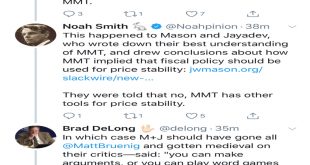L. Randall Wray How to Pay for the Green New DealWORKING PAPER NO. 931 | May 2019 This paper follows the methodology developed by J. M. Keynes in his How to Pay for the War pamphlet to estimate the “costs” of the Green New Deal (GND) in terms of resource requirements. Instead of simply adding up estimates of the government spending that would be required, we assess resource availability that can be devoted to implementing GND projects. This includes mobilizing unutilized and...
Read More »HOW TO PAY FOR THE WAR
Remarks by L. Randall Wray at “The Treaty of Versailles at 100: The Consequences of the Peace”, a conference at the Levy Economics Institute, Bard College, May 3, 2019. I’m going to talk about war, not peace, in relation to our work on the Green New Deal—which I argue is the big MEOW—moral equivalent of war—and how we are going to pay for it. So I’m going to focus on Keynes’s 1940 book— How To Pay for the War—the war that followed the Economic Consequences of the Peace. Our analysis...
Read More »A Must Read: Why does everyone hate MMT?
By L.Randall Wray The attacks on MMT continue full steam ahead. Janet Yellen (former Fed chair, but clueless on money and banking)—a centrist–has joined the fray. Jerry Epstein—on the official left–has ramped up his ridiculous claims, now associating MMT with “America First” and fascism (you knew that was coming—it has always been the refuge of critics who couldn’t come up with valid critiques). But there are some rays of light. Bloomberg published a more balanced assessment...
Read More »A Conspiracy Against MMT? Chicago Booth’s Polling and Trolling
By L. Randall Wray MMT continues to inflame hysterical attacks. Who would have thought that it would take MMT to bring together everyone from the crazy right to the insular left to unite in common cause against an obscure theory of money and government finance? The attacks seem to be so concerted and coordinated that one starts to think there just might be a conspiracy behind them. But why? Bill Black’s recent column The Day Orthodox Economists Lost Their Minds and Integrity exposes the...
Read More »MMT Responds to Brad DeLong’s Challenge
By L. Randall Wray In recent days MMT has captured the attention of anyone who can fog a mirror—even those long thought dead. The critics are out in full force—from the crazy right to the insular left. A short list includes Doug Henwood, Jerry Epstein, Josh Mason, Paul Krugman, Larry Summers, Ken “Mr Spreadsheet” Rogoff, Bill Gates, Larry Fink, George Selgin, Noah Smith, and Fed Chairman Powell. After laboring for a quarter century in the wilderness, the developers of MMT are pilloried...
Read More »Response to Doug Henwood’s Trolling in Jacobin
Doug Henwood has posted up at Jacobin an MMT critique that amounts to little more than a character assassination. It is what I’d expect of him in his reincarnation as a Neoliberal critic of progressive thought. (https://www.jacobinmag.com/2019/02/modern-monetary-theory-isnt-helping). It adopts all the usual troll methodology: guilt by association, taking statements out of context, and paraphrasing (wrongly) without citation. According to Henwood, MMT is tainted by Warren Mosler’s...
Read More »This Time Is Different: Wray on Modern Monetary Theory
Michael Stephens | February 4, 2019 Public interest in Modern Monetary Theory (MMT) is undergoing a new growth spurt, and progressive politicians are playing a key role in the current phase. Rep. Ocasio-Cortez recently referenced the heterodox framework to push back against the assumption that her ambitious policy proposals must, as a matter of financial necessity, be made budget-neutral (an assumption, as Brendan Greeley...
Read More »Understanding Modern Money – Video
Randall Wray presents in English the German version of his book “Understanding Modern Money”. The intro is in German, Randy’s presentation is in English. [embedded content] [Translate]
Read More »An MMT View of the Twin Deficits Debate
Invited Presentation by L. Randall Wray at the UBS European Conference, London, Tuesday 13 November 2018 Q: These questions about deficits are usually cast as problems to be solved. You come from a different way of framing the issue, often referred to as MMT, which—at the risk of oversimplifying—says that we worry far too much about debt issuance. Can you help us understand where fears may be misplaced? Wray: First let me say that I think the twin deficits argument is based on flawed...
Read More »Randy Wray — A Better Way to Think about the “Twin Deficits”
(These remarks will be delivered today at the UBS European Conference in London.) Multiplier EffectA Better Way to Think about the “Twin Deficits”L. Randall Wray | November 13, 2018
Read More » Heterodox
Heterodox

